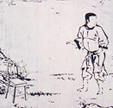Above the Law
On April 20, 2004, George Bush, Jr. told reporters:
Now, by the way, any time you hear the United States government talking about wiretap, it requires — a wiretap requires a court order. Nothing has changed, by the way. When we're talking about chasing down terrorists, we're talking about getting a court order before we do so.
In fact, Bush had already ordered the National Security Agency to establish domestic wiretaps without warrants.
After the wiretap scheme belatedly surfaced this month, the administration went into defense mode. In radio and tv addresses, Bush said that Congress had authorized such activity after 9/11. Dick Cheney declared that in the post-9/11 world, warrantless domestic surveillance was constitutional.
Unfortunately, neither claim is true. Congress can not and did not grant Bush the power to conduct illegal domestic spy operations; and as far as I can recall, the 9/11 hijackers did not amend the Constitution.
Cheney has further suggested that Bush is merely restoring powers eroded by Watergate and Vietnam:
Watergate and a lot of the things around Watergate and Vietnam, both during the 1970s, served, I think, to erode the authority I think the president needs to be effective, especially in the national security area. Especially in the day and age we live in…the president of the United States needs to have his constitutional powers unimpaired, if you will, in terms of the conduct of national security policy.
Cheney’s assessment is unfounded. Presidential powers increased with U.S. involvement in Vietnam, particularly following the Gulf of Tonkin hoax. And while Watergate damaged Richard Nixon’s individual presidency, it did not diminish presidential powers in general.
Even right-wingers normally indifferent to Bush’s crimes are bothered by illegal domestic spying. Neil Steinberg wrote:
The president keeps saying how dangerous our enemies are, how they are out to harm us — no doubt. But how does that translate into his seizing the ability to wiretap Americans, contrary to the rule of law? There are already legal mechanisms in place to tap first and get a warrant later, so the argument of urgent need is false. (Chicago Sun-Times, 12/21/05, p. 24)
George Will, famously right-wing, titled his column for 12/21/05 “Bush wrong to OK spying without going to courts, Congress.”
U.S. District Judge James Robertson, one of 11 judges on the Foreign Intelligence Surveillance Court, resigned in protest of Bush’s secret wiretaps.
Violations of the FISA (Foreign Intelligence Surveillance Act) provisions carry jail terms and fines. When Bush appeared on tv to justify his actions, he essentially confessed to multiple felonies. He became, in the view of former Nixon counsel John Dean, the first President to publicly admit impeachable offenses. Barons online agreed, calling for the House Judiciary Committee to investigate the matter “and report either a bill that would change the wiretap laws to suit the president or a bill of impeachment.”*
___________________
Now, by the way, any time you hear the United States government talking about wiretap, it requires — a wiretap requires a court order. Nothing has changed, by the way. When we're talking about chasing down terrorists, we're talking about getting a court order before we do so.
In fact, Bush had already ordered the National Security Agency to establish domestic wiretaps without warrants.
After the wiretap scheme belatedly surfaced this month, the administration went into defense mode. In radio and tv addresses, Bush said that Congress had authorized such activity after 9/11. Dick Cheney declared that in the post-9/11 world, warrantless domestic surveillance was constitutional.
Unfortunately, neither claim is true. Congress can not and did not grant Bush the power to conduct illegal domestic spy operations; and as far as I can recall, the 9/11 hijackers did not amend the Constitution.
Cheney has further suggested that Bush is merely restoring powers eroded by Watergate and Vietnam:
Watergate and a lot of the things around Watergate and Vietnam, both during the 1970s, served, I think, to erode the authority I think the president needs to be effective, especially in the national security area. Especially in the day and age we live in…the president of the United States needs to have his constitutional powers unimpaired, if you will, in terms of the conduct of national security policy.
Cheney’s assessment is unfounded. Presidential powers increased with U.S. involvement in Vietnam, particularly following the Gulf of Tonkin hoax. And while Watergate damaged Richard Nixon’s individual presidency, it did not diminish presidential powers in general.
Even right-wingers normally indifferent to Bush’s crimes are bothered by illegal domestic spying. Neil Steinberg wrote:
The president keeps saying how dangerous our enemies are, how they are out to harm us — no doubt. But how does that translate into his seizing the ability to wiretap Americans, contrary to the rule of law? There are already legal mechanisms in place to tap first and get a warrant later, so the argument of urgent need is false. (Chicago Sun-Times, 12/21/05, p. 24)
George Will, famously right-wing, titled his column for 12/21/05 “Bush wrong to OK spying without going to courts, Congress.”
U.S. District Judge James Robertson, one of 11 judges on the Foreign Intelligence Surveillance Court, resigned in protest of Bush’s secret wiretaps.
Violations of the FISA (Foreign Intelligence Surveillance Act) provisions carry jail terms and fines. When Bush appeared on tv to justify his actions, he essentially confessed to multiple felonies. He became, in the view of former Nixon counsel John Dean, the first President to publicly admit impeachable offenses. Barons online agreed, calling for the House Judiciary Committee to investigate the matter “and report either a bill that would change the wiretap laws to suit the president or a bill of impeachment.”*
___________________


<< Home